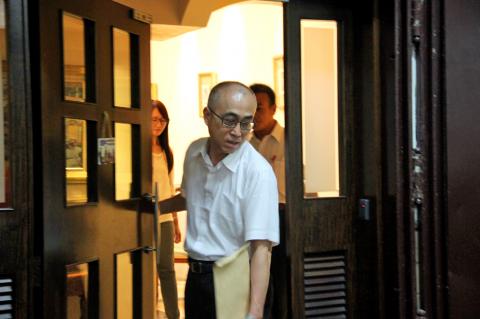The Taiwan High Prosecutors’ Office yesterday turned down a request to get involved in the investigation into former Mainland Affairs Council deputy minister Chang Hsien-yao (張顯耀) on allegations of treason.
The director of the Ministry of Justice’s Investigation Bureau, Chen Rong-fu (陳榮富), and three other bureau officials took the material that the bureau had gathered so far in its probe into Chang’s actions to the prosecutors’ office yesterday afternoon.
Chen spent an hour discussing the case with office Director-General Wang Tian-sheng (王添勝) and prosecutors Kuo Wen-tong (郭文東), Tseng Chao-kai (曾昭愷) and Yu Li-chen (余麗貞).

Photo: Chang Wen-chuan, Taipei Times
However, the prosecutors’ office declined to take over the investigation, citing a lack of evidence that would bring the case under the office’s remit.
Kuo said the office asked the bureau to gather more evidence before sending its case to it for review.
Chang is being investigated for allegedly violating the National Security Information Protection Act (國家安全機密保護法) by divulging “confidential” information on at least two separate instances.
Under the act, information is given three designations: top secret, secret and confidential.
“Confidential” is applied to information that would cause identifiable damage to national security.
However, there is no indication that the allegations against Chang involve either the unintentional divulging of confidential information or a deliberate act.
Senior prosecutors said the fact that the bureau took the case directly to the Taiwan High Prosecutors’ Office and not a local prosecutors’ office shows that the case touched on national security issues.
Such violations may be tied into violation of Article 109 of the Criminal Code, which could lead to a prison sentence of one year to seven years, senior prosecutors said.
Additional reporting by CNA

CHAOS: Iranians took to the streets playing celebratory music after reports of Khamenei’s death on Saturday, while mourners also gathered in Tehran yesterday Iranian Supreme Leader Ayatollah Ali Khamenei was killed in a major attack on Iran launched by Israel and the US, throwing the future of the Islamic republic into doubt and raising the risk of regional instability. Iranian state television and the state-run IRNA news agency announced the 86-year-old’s death early yesterday. US President Donald Trump said it gave Iranians their “greatest chance” to “take back” their country. The announcements came after a joint US and Israeli aerial bombardment that targeted Iranian military and governmental sites. Trump said the “heavy and pinpoint bombing” would continue through the week or as long

TRUST: The KMT said it respected the US’ timing and considerations, and hoped it would continue to honor its commitments to helping Taiwan bolster its defenses and deterrence US President Donald Trump is delaying a multibillion-dollar arms sale to Taiwan to ensure his visit to Beijing is successful, a New York Times report said. The weapons sales package has stalled in the US Department of State, the report said, citing US officials it did not identify. The White House has told agencies not to push forward ahead of Trump’s meeting with Chinese President Xi Jinping (習近平), it said. The two last month held a phone call to discuss trade and geopolitical flashpoints ahead of the summit. Xi raised the Taiwan issue and urged the US to handle arms sales to

State-run CPC Corp, Taiwan (CPC, 台灣中油) yesterday said that it had confirmed on Saturday night with its liquefied natural gas (LNG) and crude oil suppliers that shipments are proceeding as scheduled and that domestic supplies remain unaffected. The CPC yesterday announced the gasoline and diesel prices will rise by NT$0.2 and NT$0.4 per liter, respectively, starting Monday, citing Middle East tensions and blizzards in the eastern United States. CPC also iterated it has been reducing the proportion of crude oil imports from the Middle East and diversifying its supply sources in the past few years in response to geopolitical risks, expanding

Pro-democracy media tycoon Jimmy Lai’s (黎智英) fraud conviction and prison sentence were yesterday overturned by a Hong Kong court, in a surprise legal decision that comes soon after Lai was jailed for 20 years on a separate national security charge. Judges Jeremy Poon (潘兆初), Anthea Pang (彭寶琴) and Derek Pang (彭偉昌) said in the judgement that they allowed the appeal from Lai, and another defendant in the case, to proceed, as a lower court judge had “erred.” “The Court of Appeal gave them leave to appeal against their conviction, allowed their appeals, quashed the convictions and set aside the sentences,” the judges